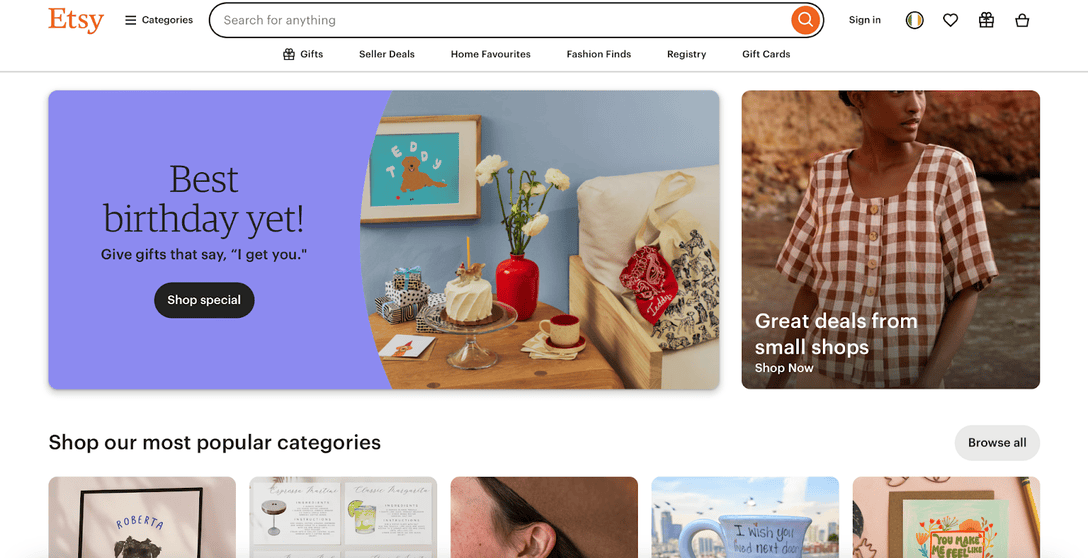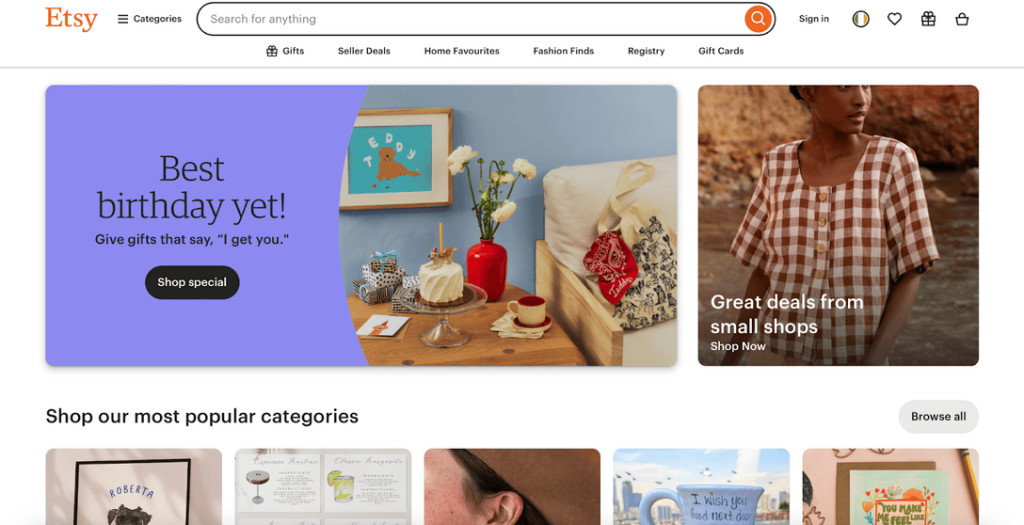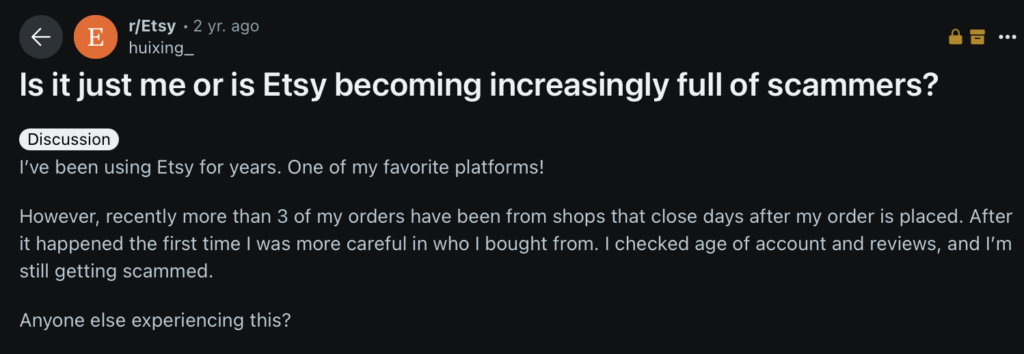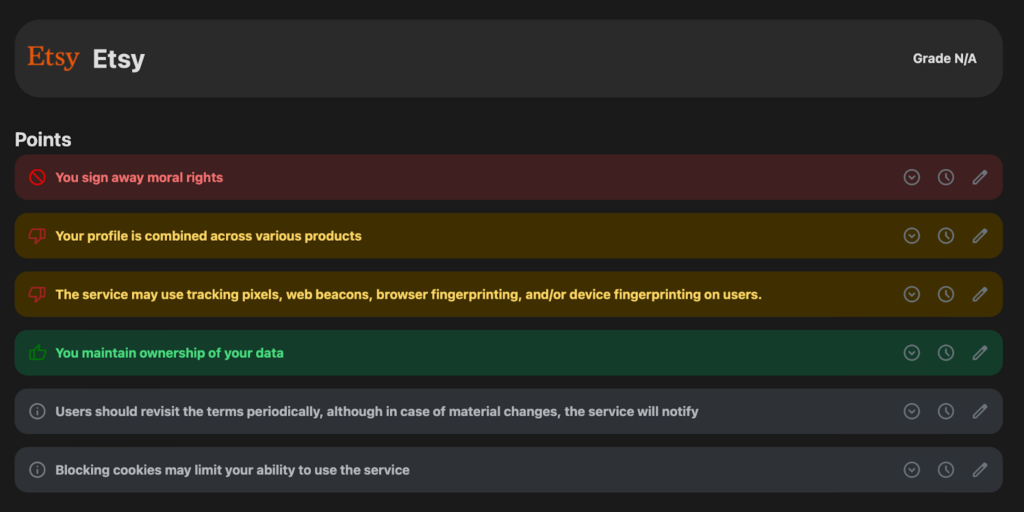Is Etsy a Scam?
Laura Martisiute
Reading time: 6 minutes

Table of Contents
If you’re thinking of shopping on Etsy, you need to know: Is Etsy a scam?
Below, we explain whether Etsy is a scam and discuss some steps you can take to improve your safety when using this platform.
What Is Etsy?
Etsy is an online marketplace for handmade, vintage, and crafting products. It was founded in 2005 and is based in the US.

Though best known for unique, handcrafted items, Etsy also permits mass-manufactured items to be featured on their platform, as long as the original design comes from the seller.
The platform has millions of items across many different categories, such as clothing, art, home decor, jewelry, toys, and more.
Is Etsy a Scam?
No, Etsy is not a scam. It’s a legitimate e-commerce company for selling and buying handmade, vintage, or unique goods (physical and digital).
However, just like on any large platform, scams can occur.
For example, scammers may advertise high-quality items but ship inferior or fake products or ship products that are significantly different from what was ordered.
Scammers also create fake shops to steal money and personal information without any intention of fulfilling orders.

Scammers don’t just target buyers on Etsy. They go after sellers, too.
In at least one scenario, scammers posed as interested buyers on Etsy, claiming they needed the seller’s email address because “Etsy is asking for it.” Once the seller provided their email, they received a spoofed message or email telling them to “verify” their shop.
The link led to a fake verification page that asked for sensitive information.

The marketplace has purchase protection programs for both buyers and sellers.
Security
On its website, Etsy says it strives to protect sensitive data “through various means, such as technical safeguards, procedural requirements and policies, an intensive program of monitoring on both our web platform and within our corporate network, continuous testing of aspects of our security posture internally and with outside vendors, a robust incident response program, and regular training for employees.”
All credit card information you share with Etsy is protected using Transport Layer Security (TLS) encryption.
Etsy also uses tokenization through its payment processors, meaning that it never stores complete credit card numbers.
Privacy
In its privacy policy, Etsy explains the kind of data it collects, why, and with whom it shares it.
It collects the information you provide directly, like your:
- Buyer & seller details (name, email address, payment/billing info, IDs, etc.).
- Transaction data.
- Community & communication (e.g., forum posts, messages, reviews, and photos/videos).
- Promotions & customer support (e.g., info for sweepstakes, survey responses, and support interactions).
It also collects certain information automatically, including:
- Technical & usage data (e.g., IP address, device info, browser details, app usage patterns).
- Location (general location derived from IP or precise location if granted permission).
- Cookies & similar tools.
Plus, it gets your data from third parties, such as:
- Payment processors (for billing data, fraud prevention, etc.)
- Advertising/marketing partners (for ad performance metrics, demographic data).
- Linked accounts (e.g., Google/Facebook).
Etsy uses this information for contractual needs (to provide the app/site, verify sellers, etc.), legal compliance, and legitimate interests (e.g., personalized services). It may also use your data with your consent for email marketing, personalized ads on third-party sites, collection of precise location or camera access, and biometric data for identity checks in some regions.
It may share your information within Etsy’s corporate group and with service providers and business partners. It may also share it for legal/regulatory purposes and business reorganization (if Etsy is sold or merged).
Your profile information, reviews, and listings are publicly displayed, meaning anyone can see this data.
Data may be transferred to the U.S. or other countries and retained only as long as needed for business or legal obligations.
Terms of Service; Didn’t Read (ToS;DR), an internet project that rates internet services’ privacy policies, hasn’t rated Etsy yet.
However, ToS;DR does highlight a few potential issues with the platform, including:
- Your profile is combined across various products.
- The service may use tracking pixels, web beacons, browser fingerprinting, and/or device fingerprinting on users.

On the plus side, ToS;DR says that you get to maintain ownership of your data.
The Common Sense Privacy Program gives Etsy a “Warning” rating. This means Etsy “Does not meet our recommendations for privacy and security practices.”

Among the issues highlighted are that Etsy displays personalized advertising and allows third parties to collect data for their own purposes.
The Common Sense Privacy Program also notes that users’ information is used to track and target advertisements on other third-party websites or services.
So, Should You Use Etsy?
Yes. Etsy is a great platform for individuals looking to sell and buy unique or handmade products.
However, both buyers and sellers should be aware of common Etsy scams.
How to Use Etsy Safely
- Choose a unique password. Make sure it’s hard to guess, and don’t use it on other sites.
- Turn on two-factor authentication (2FA). This adds an extra layer of security to your Etsy account because a second verification step is required before granting access.
- Verify website links and messages. Always check the URL (e.g., etsy.com or .etsy.com subdomains), and don’t click on any suspicious links in emails or messages. If an email says it’s from Etsy but the format, content, or sender address looks off, log in to your Etsy account directly instead of clicking on the link.
- Use Etsy’s messaging system for all buyer-seller communications. This protects you in case something goes wrong.
- Don’t overshare. Avoid sharing unnecessary personal data (like your full legal name, outside payment info, or personal email). If someone asks for sensitive information (credit card numbers, ID numbers) through an Etsy message, it’s a red flag. Etsy does not require these details through direct messages.
- Don’t process payments outside Etsy. This violates Etsy’s policies and can be a red flag for scams.
- Check Etsy shop reviews and policies. Look at Etsy seller ratings and reviews from previous buyers to gauge reliability. Review shop policies on returns, shipping, and custom orders.
- Be cautious with special offers. If a seller offers deep discounts off-platform, you should be wary.
- Perform a reverse image search. If a product looks too good to be true, do a quick reverse image search to see if it’s sold outside of Etsy and is actually a scam.
- Delete your Etsy account. If you no longer use Etsy, delete your Etsy account.
Our privacy advisors:
- Continuously find and remove your sensitive data online
- Stop companies from selling your data – all year long
- Have removed 35M+ records
of personal data from the web
Save 10% on any individual and
family privacy plan
with code: BLOG10
news?
Don’t have the time?
DeleteMe is our premium privacy service that removes you from more than 750 data brokers like Whitepages, Spokeo, BeenVerified, plus many more.
Save 10% on DeleteMe when you use the code BLOG10.

















